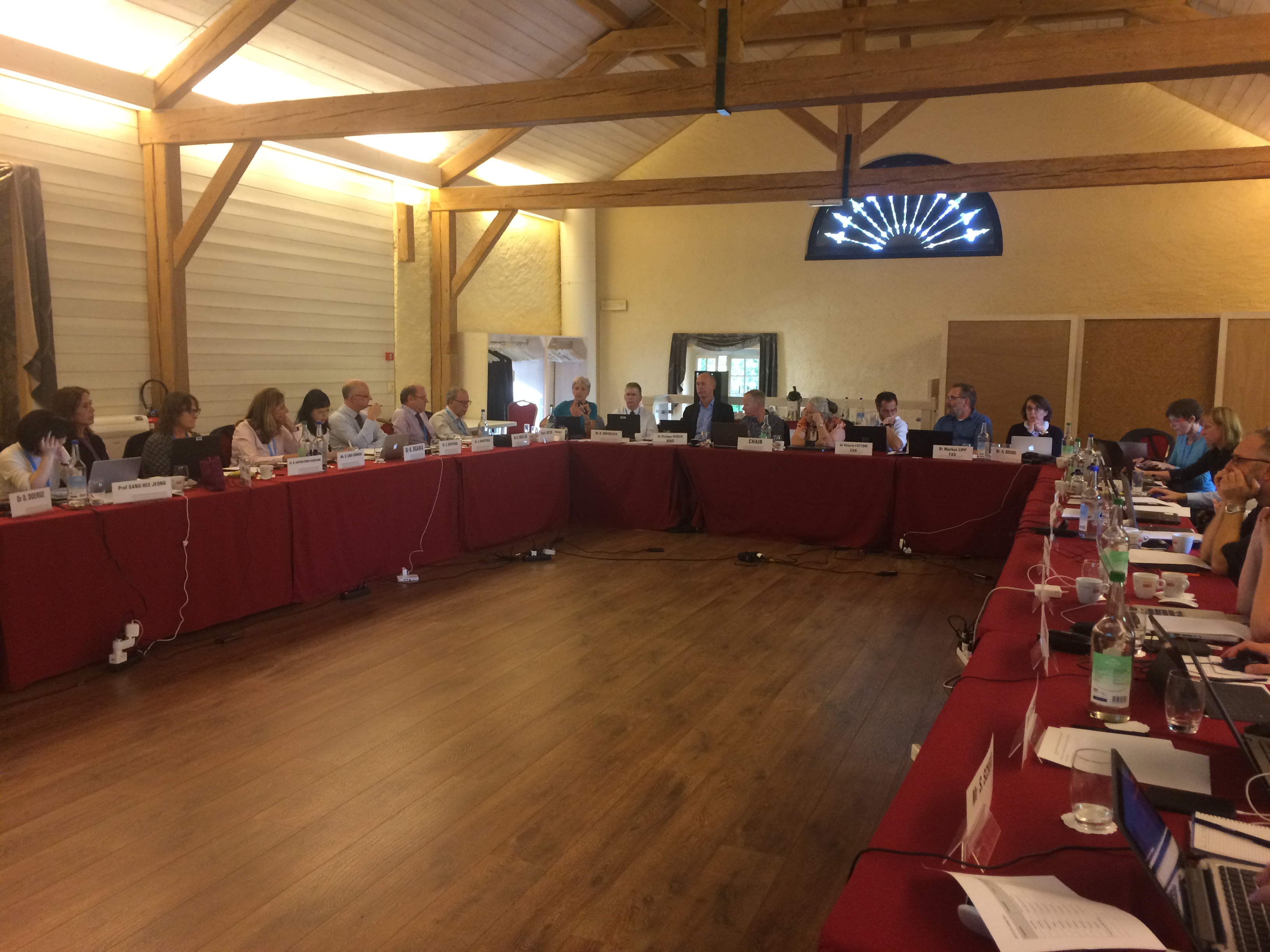Scientific basis of Codex work on veterinary drug residues
Geneva, Switzerland
The FAO/WHO Joint Expert Committee on Food Additives (JECFA) provides independent scientific advice to Codex on the safety of food additives, contaminants and residues of veterinary drugs. JECFA scientific advice on residues of veterinary drugs allows the Codex Committee on Residues of Veterinary Drugs in Foods (CCRVDF) to recommend maximum residue limits in food and other risk management recommendations to the Codex Alimentarius Commission. These standards help the 188 Codex members to protect consumer health and ensure fair practices in the food trade.
The 85th JECFA meeting, dedicated to veterinary drug residues, is taking place in Geneva, Switzerland from 24 October to 2 November 2017.

Discussions at JECFA
The meeting is attended by independent members and experts, the FAO and WHO JECFA Secretariat and the Codex Secretariat. Dr Kevin Greenlees, CCRVDF Chairperson, is also participating in the meeting.
Assuring the safety of residues of veterinary drugs in food to the global community.
“The food we eat more and more comes from around the world," said Dr Greenlees. "The independent, expert assessments provided by JECFA are essential to allow CCRVDF member countries to step outside of their national concerns to consider how to manage risk and develop international standards to assure the safety of residues of veterinary drugs in food to the global community.”
The agenda of the 85th JECFA meeting includes requests for the evaluation of veterinary drug residues formulated by the 23rd Session of the CCRVDF and some arising from the previous meeting of JECFA dedicated to veterinary drugs.
The outcomes of the 85th JECFA, will be published in the JECFA report and FAO and WHO monographs and considered by the 24th Session of CCRVDF that will be held in Chicago (USA) from 23 to 27 April 2018.
Rain Yamamoto
Learn more about JECFA
WHO website: http://www.who.int/foodsafety/areas_work/chemical-risks/jecfa/en/
FAO website: http://www.fao.org/food/food-safety-quality/scientific-advice/jecfa/en/
Learn more about CCRVDF
CCRVDF on the Codex website: http://www.fao.org/fao-who-codexalimentarius/committees/committee-detail/en/?committee=CCRVDF
At the heart of the Codex mandate are the core values of collaboration, inclusiveness, consensus building and transparency. Governmental and non-governmental, public and private organizations alike play a vital role in ensuring Codex texts are of the highest quality and based on sound science.
Codex would have little authority in the field of international standard setting if it did not welcome and acknowledge the valuable contributions made by observers. Expert technical bodies, industry and consumer associations
contribute to the standard-setting process in a spirit of openness, collaboration and transparency.
Intergovernmental organizations (IGOs) and international non-governmental organizations (NGOs) can apply for observer status in Codex in order to attend and put forward their views at every stage of the standard-setting process.
 Current Codex Alimentarius Commission
Current Codex Alimentarius Commission
Scientific basis of Codex work on veterinary drug residues
Geneva, Switzerland
The FAO/WHO Joint Expert Committee on Food Additives (JECFA) provides independent scientific advice to Codex on the safety of food additives, contaminants and residues of veterinary drugs. JECFA scientific advice on residues of veterinary drugs allows the Codex Committee on Residues of Veterinary Drugs in Foods (CCRVDF) to recommend maximum residue limits in food and other risk management recommendations to the Codex Alimentarius Commission. These standards help the 188 Codex members to protect consumer health and ensure fair practices in the food trade.
The 85th JECFA meeting, dedicated to veterinary drug residues, is taking place in Geneva, Switzerland from 24 October to 2 November 2017.

Discussions at JECFA
The meeting is attended by independent members and experts, the FAO and WHO JECFA Secretariat and the Codex Secretariat. Dr Kevin Greenlees, CCRVDF Chairperson, is also participating in the meeting.
Assuring the safety of residues of veterinary drugs in food to the global community.
“The food we eat more and more comes from around the world," said Dr Greenlees. "The independent, expert assessments provided by JECFA are essential to allow CCRVDF member countries to step outside of their national concerns to consider how to manage risk and develop international standards to assure the safety of residues of veterinary drugs in food to the global community.”
The agenda of the 85th JECFA meeting includes requests for the evaluation of veterinary drug residues formulated by the 23rd Session of the CCRVDF and some arising from the previous meeting of JECFA dedicated to veterinary drugs.
The outcomes of the 85th JECFA, will be published in the JECFA report and FAO and WHO monographs and considered by the 24th Session of CCRVDF that will be held in Chicago (USA) from 23 to 27 April 2018.
Rain Yamamoto
Learn more about JECFA
WHO website: http://www.who.int/foodsafety/areas_work/chemical-risks/jecfa/en/
FAO website: http://www.fao.org/food/food-safety-quality/scientific-advice/jecfa/en/
Learn more about CCRVDF
CCRVDF on the Codex website: http://www.fao.org/fao-who-codexalimentarius/committees/committee-detail/en/?committee=CCRVDF
 Codex and Observer
Codex and Observer
around the world since ancient times.
We might not always know where it comes from,
but we expect it to be available, safe and of good quality.










Leave a comment